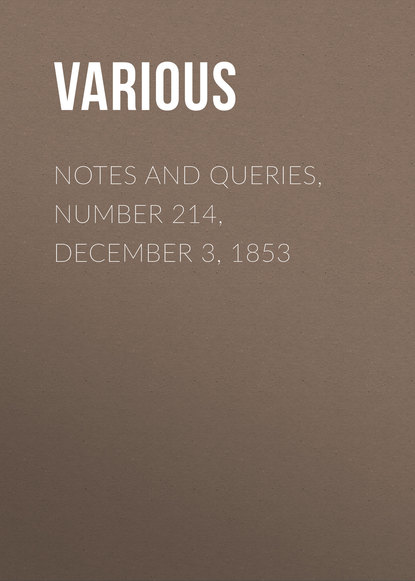По всем вопросам обращайтесь на: info@litportal.ru
(©) 2003-2024.
✖
Notes and Queries, Number 214, December 3, 1853
Автор
Год написания книги
2019
Настройки чтения
Размер шрифта
Высота строк
Поля
Charles Chadwick, Esq., of Healy Hall, Lancashire, and Mavesyn-Ridware, in the county of Stafford, to whom the monks of St. Stephen, at Caen, presented, in the year 1786, a series of encaustic tiles with heraldic devices taken from the floor of the (so called) "Great Guard Chamber of the Palace of the Dukes of Normandy," died in 1829. I infer that the tiles were brought to the Lancashire residence of Mr. Chadwick because the description and the drawing for the engraving were both supplied to the Gentleman's Magazine by a Lancashire antiquary, Thomas Barnett, of Hydes Cross, Manchester: but as the descendants of Mr. Chadwick no longer reside in Lancashire, the hall being occupied by a woollen manufacturer, I have been unable to obtain any information respecting the tiles, though long desirous to do so.
I direct attention to another series of the same tiles, sixteen in number, which were presented to the Society of Antiquaries through the president, the Earl of Leicester, in 1788, by John Henniker, Esq., M.A., F.R.S., S.A., and M.P., who afterwards took the additional name of Major. This gentleman received the tiles from his brother, Captain Henniker, then resident at Caen; and in 1794 he published an interesting account of them with engravings, entitled Two Letters on the Origin, Antiquity, and History of Norman Tiles stained with Armorial Bearings (London, John Bell, Strand). The engravings both in this volume and in the Gentleman's Magazine are indifferently executed, and too small in scale to be of use. Mr. Henniker describes the colours of his tiles to be "yellow and brown," while Mr. Barnett states that the tiles in Mr. Chadwick's possession were "light grey and black;" a curious discrepancy, seeing that in all other respects they were exactly similar. These tiles are of so much heraldic and antiquarian interest that if either set could be made available for the purpose, it is very desirable that they be engraved of full size, and printed by the modern easy process to imitate the colours.
Gilbert J. French.
MOTTOS OF THE EMPERORS OF GERMANY
(Vol. viii., p. 170.)
With your permission I shall enlarge the list of mottos of the German emperors, as well by commencing with the Germano-Frankish era as by supplying those omitted in the series given by Mr. Joshua G. Fitch. My authorities are Reusneri Symbola Imperatoria tribus classibus Cæs. Rom. Italic., C. R. Græcorum, C. R. Germanico; and Sadeler, Symbola divina et humana Pontificum, Imperatorum, Regum, &c.:
Caroli Magni. 752. Christus regnat, vincit, triumphat.
Ludovici Pii. 814. Omnium rerum vicissitudo.
Lotharii I. 840. Ubi mel, ibi fel.
Ludovici II. 855. Par sit fortuna labori.
Caroli II. (Calvi.) 875. Justitiam injustitia parit.
Caroli III. (Crassi.) 881. Os garrulum intricat omnia.
Arnulphi. 888. Facilis descensus Averni.
Ludovici III. 899. Multorum manus, paucorum consilium.
Othonis Magni. Aut mors aut vita decora.
Othonis III. Unita virtus valet.
Henrici II. (Claudi.) Ne quid nimis.
Friderici I. (Ænobarbi.) Aliud. Qui nescit dissimulare nescit imperare.
Friderici II. Minarum strepitus, asinorum crepitus. The following is the correct reading of the words given in Vol. viii., p. 170.: Cumplurium triariorum ego strepitum audivi.
Adolphi. Animus est qui divites facit.
Alberti I. Aliud. Quod optimum idem jucundissimum.
Henrici VII. Aliud. Fide et consilio.
Ludovici IV. Sola bona quæ honesta.
Aliud. Deo et Cæsari.[4 - "Symbolum [aquila solem contrà tuens] quo jam se non tantum adversario opponit sed cum Deo parum modestè ponit. Est quidem aquila Jovi sacra ut ad fabulas rem revolvamus. Sed absit mihi omnis cum Deo comparatio."—Sadeler, p. 39.]
Caroli IV. Optimum aliena insania frui.
Aliud. Nullius pavet occursum.
Wenceslai. Morosophi moriones pessimi.
Aliud. Tempestati parendum.
Sigismundi. Aliud. Sic cedunt munera fatis.
Alberti II. Aliud. Fugam victoria nescit.
Friderici III. Rerum irrecuperabilium fœlix oblivio.
Aliud. A. E. I. O. U.
That these vowels are supposed to signify "Austriæ est imperare orbi universo" has already been communicated in "N. & Q." Reusner has given then another interpretation "Aquila electa iuste vincit omnia."
"Aliud. Hic regit, ille tuetur. Leges et arma in promptu habes, illæ regunt, hæc tuentur imperium. A Justiniano habet," &c.—Sadeler, p. 43.
Maximiliani I. Aliud. In manu Dei Regis est [cor].
Aliud. Per tot discrimina.
Caroli V. Aliud. Nondum in auge [Sol].
Aliud. Fundatori quietis [laurea].
Ferdinandi. Fiat justitia aut pereat mundus.
Aliud. A. I. P. Q. N. S. I. A.
"Accidit in puncto quod non speratur in anno;
Temporis in puncto qui sapit, ille sapit."
Maximiliani II. Comminuam vel extinguam.
(Puta semiplenam Turcarum lunulam.)
Rudolphi II. Aliud. Ex voluntate Dei omnia.
Aliud. Sic ad astra.
Aliud. Tu ne cede malis.
In Reusner's work the mottos are accompanied by copious and erudite comments; and in Sadeler's by engravings also; the devices or achievements of distinguished men, denominated in the Italian language Imprese, and in the Latin Symbola Heroica.
Bibliothecar. Chetham.
PHOTOGRAPHIC CORRESPONDENCE











